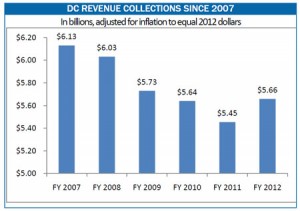Nine times in the last three years, the District’s Chief Financial Officer has reported that the city’s tax collections would be lower than previously thought. Those sobering announcements led to repeated waves of painful budget-cutting, hurting everything from affordable housing to libraries to environmental protection to street cleaning.
That’s what makes yesterday’s new revenue report ‘ that the District will collect $105 million more next year than expected ‘ especially sweet. Dr. Gandhi was able to smile while delivering a revenue announcement for the first time in three years, explaining that he sees improvements in property taxes and deed recordation and transfer taxes, as well as in sales and income taxes. The signs are positive for all of DC’s major revenue sources. Equally important, it suggests that the long downward revenue spiral caused by the recession may be coming to an end.
The cheery revenue report also was accompanied by news that spending in some key program areas, such as Medicaid, is growing more slowly than expected.
While this is great news, the bad news is still beating the good news by a score of 9 to 1. We may be climbing out of a hole, but the whole is deep. Total revenue collections* in 2012 will be $5.65 billion, nearly $500 million lower than in 2007, adjusting for inflation. Considering that health care rolls rose dramatically in the recession and that unemployment remains close to 10 percent, the District’s outlook for FY 2012 still reflects more demands but fewer resources than before the recession.
 One other sobering note: Dr. Gandhi noted that DC’s revenue outlook will be less rosy to the tune of $23 million, unless the Mayor and Council follow through on a commitment they made to close a corporate tax shelter that allows large multi-state corporations to avoid paying income taxes to DC. The Council passed legislation in 2009 to require “combined reporting” for all corporations (i.e. ensures corporations pay their fair share of DC taxes), but has yet to pass the necessary implanting legislation. Dr. Gandhi, like DCFPI, seems to be wondering what they are waiting for.
One other sobering note: Dr. Gandhi noted that DC’s revenue outlook will be less rosy to the tune of $23 million, unless the Mayor and Council follow through on a commitment they made to close a corporate tax shelter that allows large multi-state corporations to avoid paying income taxes to DC. The Council passed legislation in 2009 to require “combined reporting” for all corporations (i.e. ensures corporations pay their fair share of DC taxes), but has yet to pass the necessary implanting legislation. Dr. Gandhi, like DCFPI, seems to be wondering what they are waiting for.
Special thanks to DCFPI’s intern, Olivia Healy, for quickly pulling these numbers together.
* This includes all revenues other than “special purpose” revenues.
